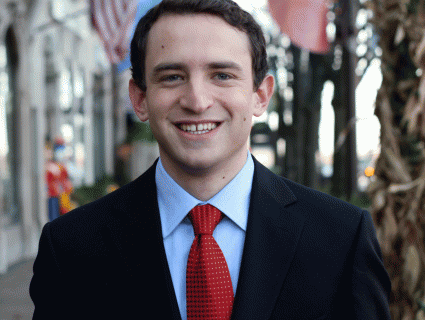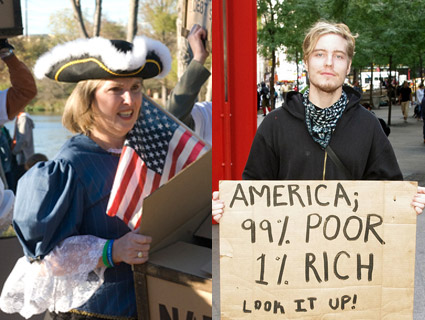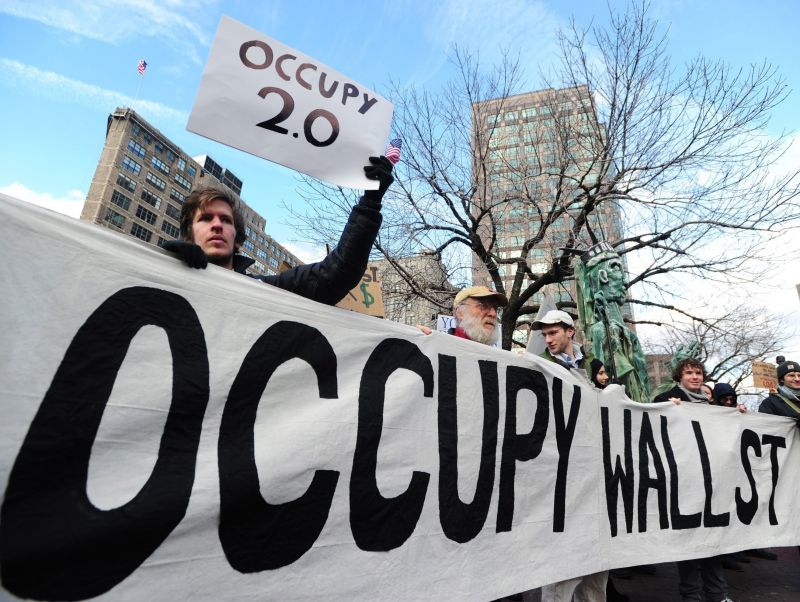
Ilya SheymanCourtesy Ilya Sheyman for Congress.
Could last fall’s Occupy fever portend a progressive takeover of Congress?
The answer could hinge on the outcome of an upcoming Democratic primary in a congressional district near Chicago, where a corporate-friendly centrist faces a remarkably stiff challenge from a 25-year-old Occupy Wall Street supporter who has even cut an OWS-themed campaign ad.
“What excited me about Occupy was that the target of this anger and frustration was finally the right one,” says Ilya Sheyman, who stepped down as national mobilization director for MoveOn.org early last year to compete for a seat held by a vulnerable GOP congressman. “I think what’s happened is people feel like, ‘Wow, we’ve changed the national conversation. Now we have to change leadership in Washington and deliver on that.'”
Sheyman’s main rival in the March 20 primary is Brad Schneider, who is running on his experience as a former accounting exec. The two have dueled for money, volunteers, and endorsements, with Schneider locking in the centrist New Democrat Coalition and moderates like House Minority Whip Steny Hoyer (D-Md.), while Sheyman has won support from MoveOn, Democracy for America, and liberals like Russ Feingold (D-Wis.). So far, Sheyman has the edge in buzz and fundraising, although competing polls have put both men in the lead.
Progressives see the race as indicative of how Occupy Wall Street has changed the 2012 electoral calculus. (Click here for our rundown of other 2012 “Occupy” candidates.) “A victory for Sheyman would send a clear, early message to all Democrats running for office,” says Neil Sroka, a spokesman for the Progressive Change Campaign Committee. “If you stand up and fight for the progressive values that matter to voters, you’ll win your primary and build the enthusiastic grassroots base of donors and volunteers that all Democrats will need to win in November.”
Illinois’ Tenth Congressional District, perched on the tony North Shore of Lake Michigan, hardly seems like a crucible of populist uprising. It contains Northbrook, Glencoe, and Lake Forest, some of Chicago’s wealthiest suburbs. In 2010, Republican Robert Dold, owner of a pest-extermination firm, beat out a moderate Democrat to win the open seat with 51 percent of the vote.
But the district also includes North Chicago and Waukegan, towns with unemployment rates of 18 to 20 percent. And last year a Democratic legislature redrew district boundaries to make the Tenth more favorable to Dems. Sheyman’s campaign calculates that the Democrat who lost to Dold would have won the redrawn district with 53 percent of the ballots.
“This district is not by any means a Democratic seat and not by any means a liberal seat,” warns Loyola University poly sci professor John Frendreis, an expert on Chicago politics. He imagines that Sheyman might follow in the footsteps of erstwhile tea partiers like Nevada’s Sharron Angle and Delaware’s Christine O’Donnell, who beat out moderate members of their party in the primaries but were too radical to unseat unpopular incumbents in the general election. “The Democratic candidates who claim they are businessmen and that kind of thing probably have a better shot against Dold,” Frendreis says. “On the other hand, I kind of think it’s going to be a Democratic year nationally. And the Democrats are going to unite in the end behind whomever wins the nomination.”
In 1991, Sheyman and his Jewish family fled religious persecution in Moscow for a fresh start in Chicago. His father began working as pizza deliveryman before landing a job as a computer programmer and eventually starting his own computer business. Sheyman benefited from English-as-a-second-language programs and college Stafford loans, graduating from McGill University in 2006 with a desire to “give other people the same opportunities that someone gave me.”
In 2004, Sheyman campaigned on behalf of a rookie Senate candidate named Barack Obama. The next year, he went to work for Obama’s Senate office, handling tasks related to veterans and military affairs, before joining his boss’ presidential campaign. “This was the campaign that got me excited about the idea that we could make progress in this country,” he says, though he’s quick to acknowledge that Obama’s presidency hasn’t lived up to everyone’s expectations.
“I think what happened after [the election] is a lot of us said, ‘Our work is done. We’ve elected Barack Obama, we have a Democratic House and Senate, we are going to see the change that we want.’ But the reality is, it takes ongoing organizing and mobilizing from the grassroots level to make all the progress we’ve got to make.”
Which is where OWS comes in. While the Occupy protesters typically eschew direct involvement in electoral politics, Sheyman believes that the movement has created the space to talk about the things he cares about. “When we started this campaign a year ago, every question was about what do you cut and how do you deal with the deficit,” Sheyman says. “Now the questions we hear about are how do you put people to work, how do you restore fairness to our tax system? That is a result of that shift in dialogue that Occupy has caused. So we now are focusing on the real challenges our community is facing. And I think that is a significant victory.”
Sheyman and Schneider both want to raise taxes on the wealthy, pursue campaign-finance reform, and boost the economy through jobs programs. But they differ on some big issues. Sheyman pledges to preserve social security benefits, while Schneider would like to to have a “long, hard conversation” about alternative ways to keep the program solvent. Sheyman wants federal jobs legislation that would directly hire people to rebuild infrastructure. Schneider would rely on private contractors to do the job. (His campaign did not respond to repeated requests from Mother Jones for an interview.)
The most apparent difference between the candidates is rhetorical. At a February 26 debate sponsored by the League of Women Voters in wealthy Lake Forest, Schneider said he believed in a “progressive tax,” but added, “I don’t believe in a redistribution of wealth.” Sheyman was more outspoken: “I think we have no choice but to let the Bush tax cuts that favor the wealthiest 2 percent of Americans expire,” he said. “But the reality is that this won’t happen without a fight. In the last election, and the election before, Democrats ran on this and then when it came time to make the decision, they extended them for two more years. The difference is, I am willing to campaign on this, I am willing to advocate for this all across our community.”
If Sheyman’s numbers are any indication, that kind talk resonates with the Democratic base. His campaign has 16,000 individual donors—that’s among the largest donor bases of any non-incumbent congressional campaign—and 600 volunteers who’ll be key to mobilizing voters in what’s expected to be a low-turnout election.
Of course, those numbers also reflect his familiarity with the grassroots organizing tactics pioneered by Obama campaign and MoveOn. And in a year marked by the rise of the young Occupy demographic and intense skepticism of Washington, he could even be getting a bump from his relative lack of years and political experience.
A poll taken in January put Sheyman two points ahead of Schneider, with 23 percent of the likely vote in a four-way contest—the other two candidates are John Tree and Vivek Bavda. But in February, Schneider released a poll suggesting he’d jumped ahead, garnering 29 percent of likely voters to Sheyman’s 14 percent. Sheyman says his rival’s poll coincided with an onslaught of pro-Schneider mailers; he has fought back with mailers knocking Schneider for having donating thousands of dollars to Republicans. He also points to his recent victory in the Tenth District Democrats straw poll, in which he was backed by 73 percent of the participants.
In the next two weeks, Sheyman must demonstrate that he can play to the political center in a district that includes plenty of voters who are solidly upper middle class. He believes many of them are willing to pay more taxes if it means a better future for their children. And he sees crossover appeal in an economic message that stresses income inequality not just between the rich and poor, but between the mega-rich and everyone else. “Right now, the wealthiest 400 Americans in this country have as much wealth as the bottom 150 million,” he said during a Democratic primary debate this fall. “We are seeing those at the top getting wealthier and wealthier, while the middle class gets squeezed. So yes, I am a supporter of Occupy Wall Street.”














